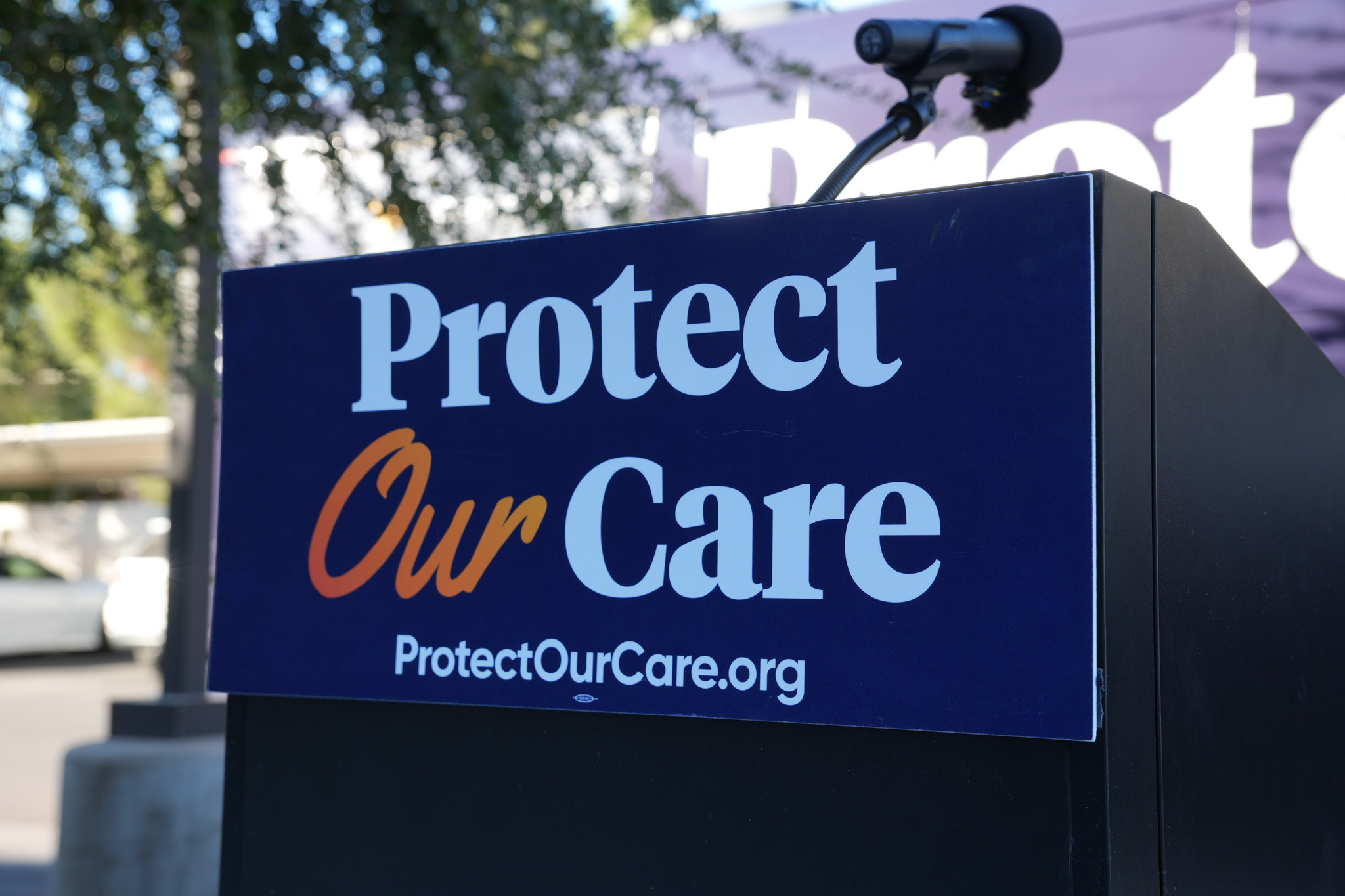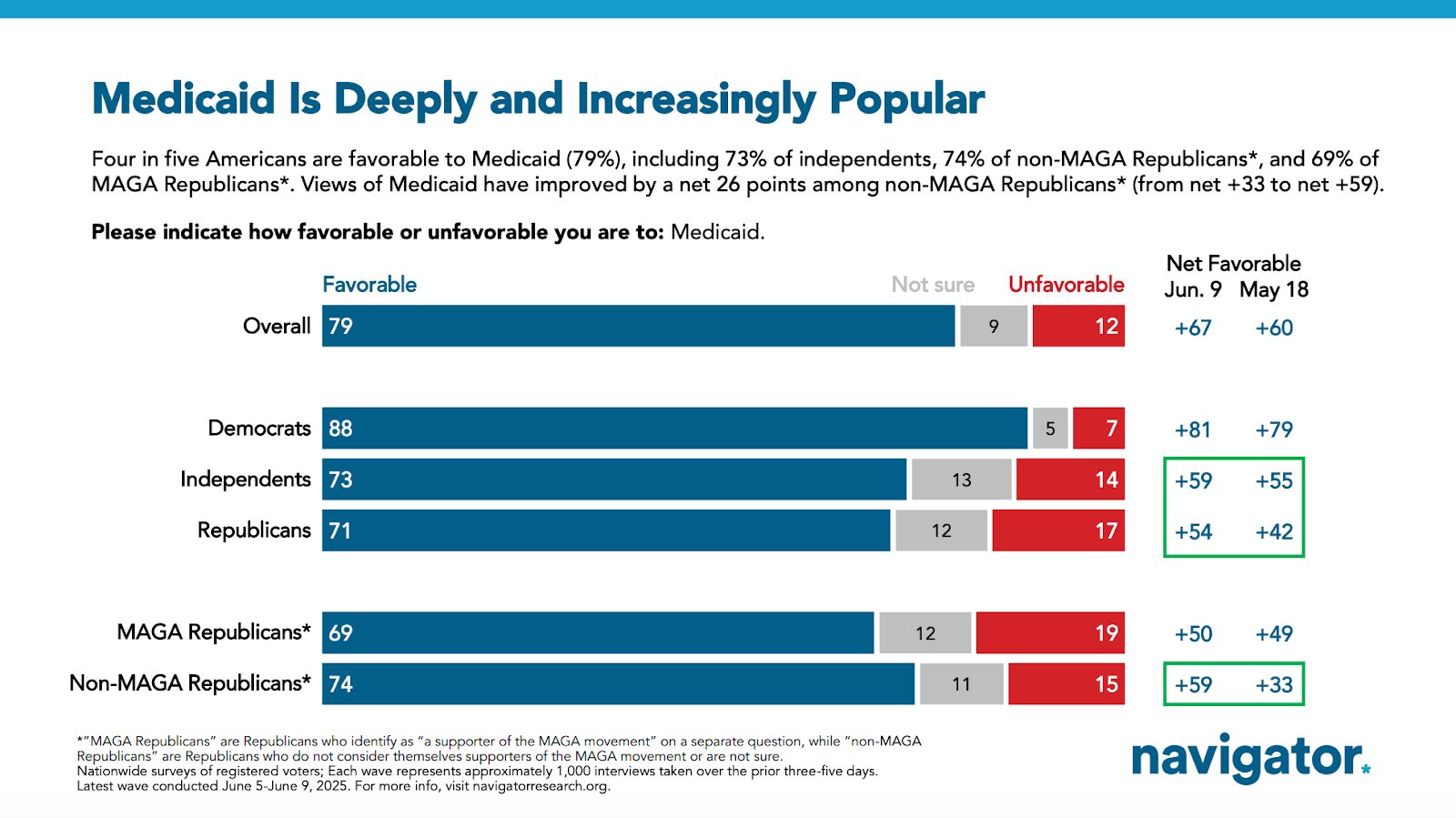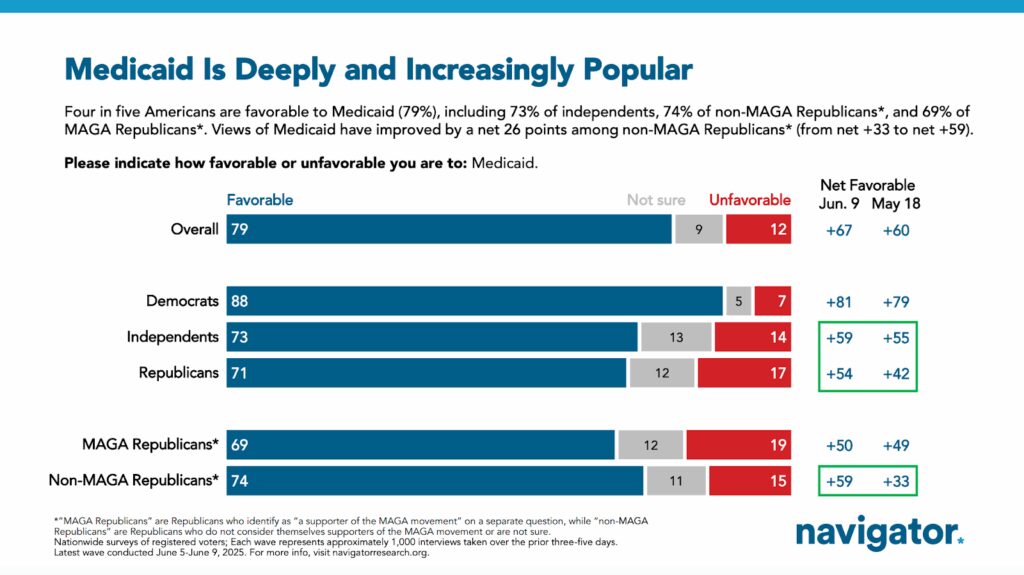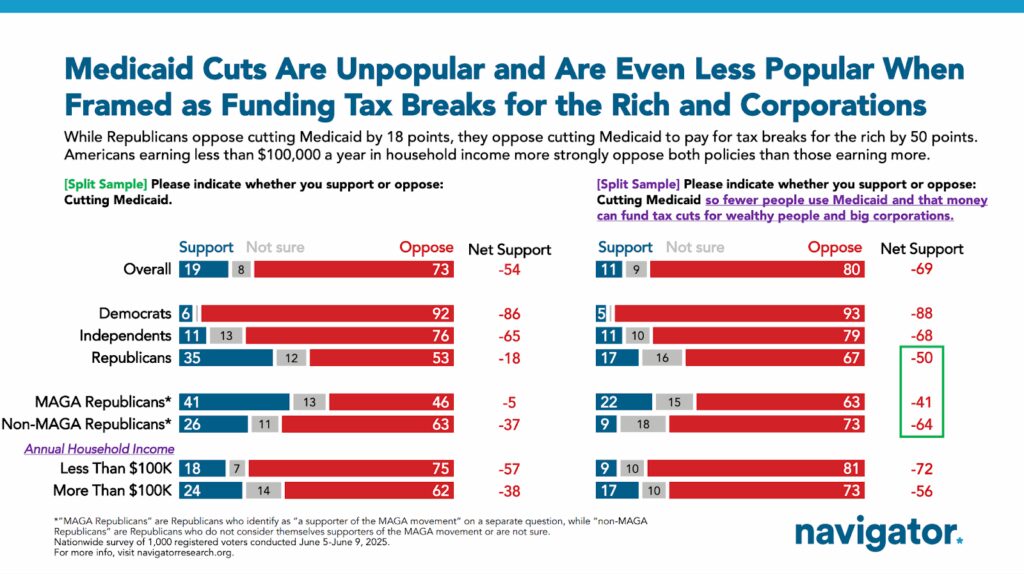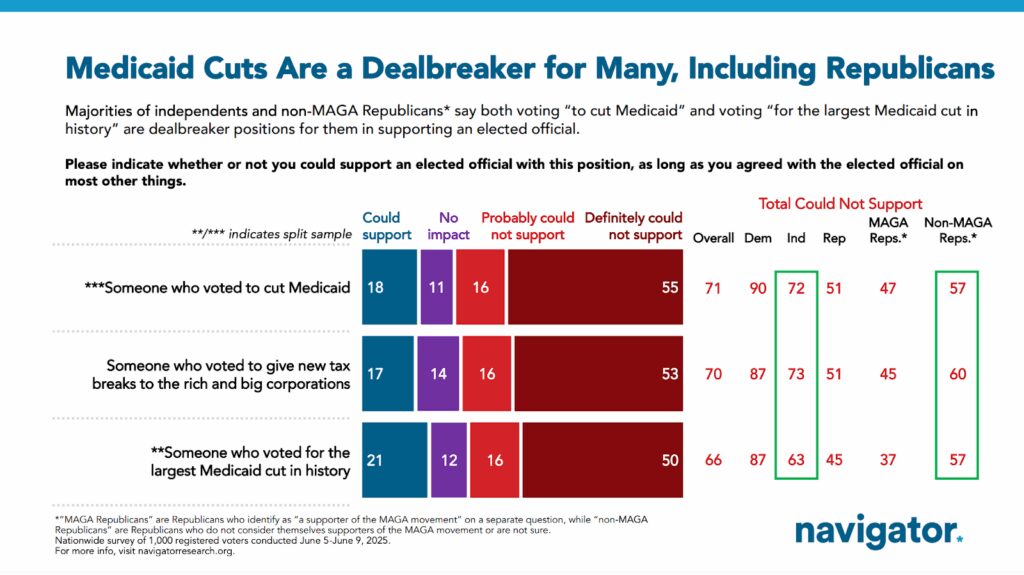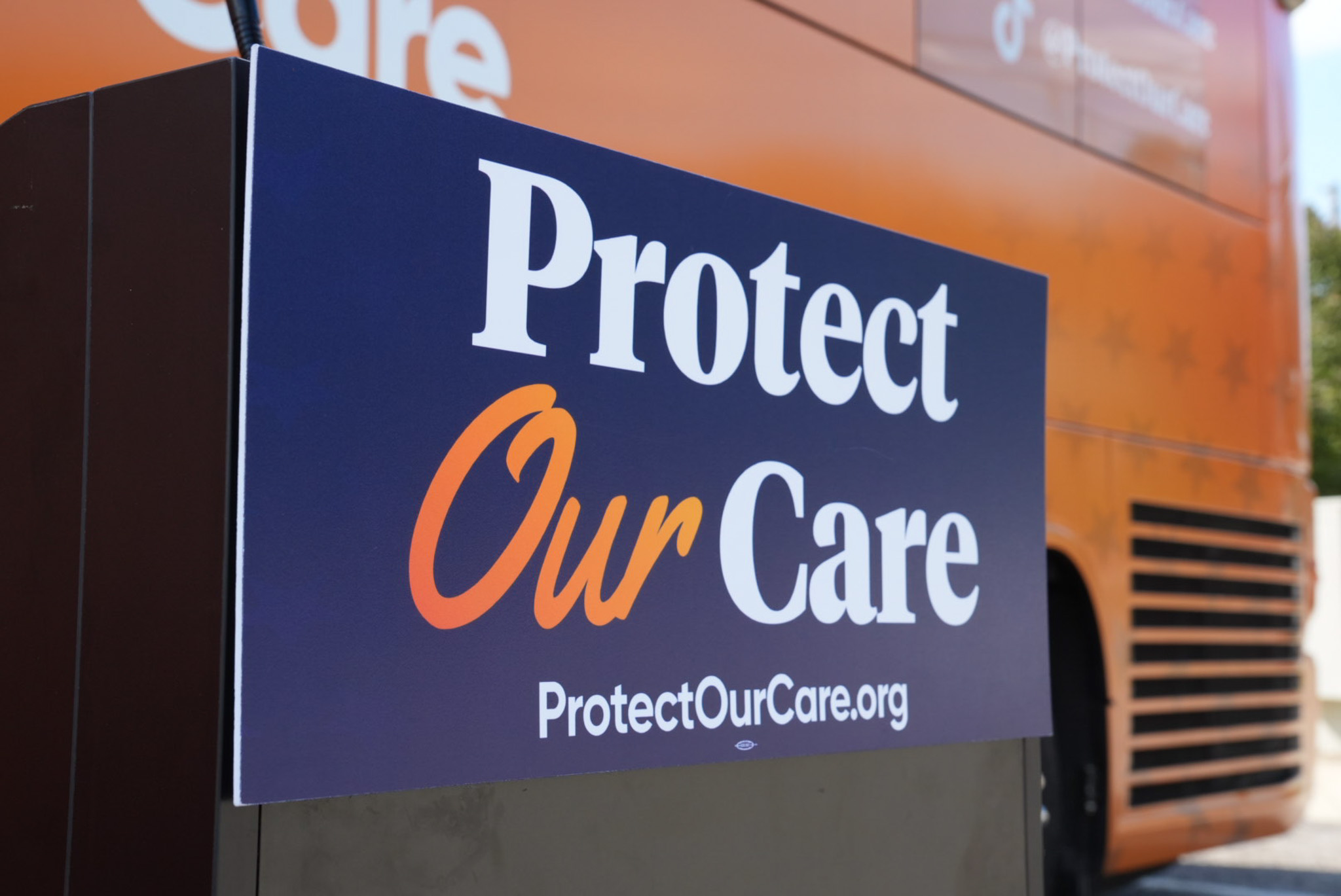
Welcome to Public Health Watch, a weekly roundup from Protect Our Care tracking catastrophic activity as part of Donald Trump’s sweeping war on health care. From installing anti-vaccine zealot RFK Jr. as Secretary of HHS to empowering Elon Musk to make indiscriminate cuts to our public health infrastructure, including the National Institutes of Health and the Centers for Disease Control, Donald Trump is endangering the lives of millions of Americans. Protect Our Care’s Public Health Watch will shine a spotlight on the worst of the Trump/RFK/Musk war on vaccines, science and public health and serve as a resource for the press, public and advocacy groups to hold them accountable.
What’s Happening In Public Health?
Catastrophic Cuts Are Creating Chaos And Endangering Americans’ Health And Scientific Innovation
ProPublica: Science Shattered The National Institutes of Health is responsible for more than 80% of the world’s grant investment in biomedical research. Its funding has sparked countless medical breakthroughs — on cancer, diabetes, strokes — and plays a fundamental role in the development of pharmaceutical drugs. Scientists compete vigorously for a slice of the more than $30 billion that the agency doles out annually; they can spend years assembling grant applications that stretch thousands of pages in hopes of convincing peer reviewers of the promise of their projects. Only 1 in 5 gets chosen. The NIH has rarely revoked funding once it has been awarded. Out of the tens of thousands of grants overseen by the institution since 2012, it terminated fewer than five for violations of the agency’s terms and conditions. Then Donald Trump was reelected. Since his January inauguration, his administration has terminated more than 1,450 grants, withholding more than $750 million in funds; officials have said they are curbing wasteful spending and “unscientific” research. The Department of Government Efficiency gave the agency direction on what to cut and why, ProPublica has previously found, bypassing the NIH’s established review process.
Stat: Hundreds of NIH grant terminations are ‘void and illegal,’ federal judge rules A federal judge deemed, on Monday, that some of the grant terminations by the National Institutes of Health are “void and illegal” in a hearing for two lawsuits against the Trump administration. The decision comes after Judge William J. Young heard arguments for over two hours at the U.S. District Court in two suits filed against the administration over the termination of hundreds of research grants by the National Institutes of Health. The decision, which can be appealed, hands a temporary victory to researchers across the country, reeling from unprecedented changes at the world’s largest public funder of biomedical research.
Axios: DOGE cuts cause FDA to delay decision on hereditary disease drug The Food and Drug Administration will miss a deadline this week deciding whether to approve a drug for a potentially life-threatening genetic disorder because of “heavy workload and limited resources,” manufacturer KalVista Pharmaceuticals said. Why it matters: It appears to be the first time an FDA review had to be extended because of DOGE-directed cuts to staff at the agency.
HuffPost: NIH Director Struggles To Defend His Own Plan To Slash $18 Billion In Medical Research National Institutes of Health director Jayanta Bhattacharya got a cool reception from Democratic and Republican senators on Tuesday as he defended his agency’s budget request for 2026, which would slash billions in cutting-edge biomedical research on cancer, Alzheimer’s disease, diabetes and other health conditions. NIH is considered the crown jewel of American science and the global leader in biomedical research and innovation. Senators in both parties are proud of its success and of their own roles in boosting its funding over the years in support of medical breakthroughs. So Bhattacharya had to know his budget request would land with a thud as he presented it to a Senate appropriations subcommittee. He kept trying to square two things that didn’t make sense: that Trump is committed to preserving America’s role as the leader in biomedical research, and that his proposed $18 billion in cuts to the agency next year ― or 40% of its entire budget ― won’t hamper that. Senators didn’t buy it. At times, Bhattacharya didn’t seem to want to defend it, either.
Stat: HHS plans ‘bold, edgy’ campaign on ultra-processed foods and diabetes The links between ultra-processed food and higher risk of diabetes will be the focus of the first wave of health secretary Robert F. Kennedy Jr.’s national “Take Back Your Health” campaign, according to a notice posted on a government site for contractors. The notice invites public relations agencies to pitch strategies for the launch of the ad campaign, “a wake-up call to Americans that eating processed foods dramatically increases the risk of diabetes and chronic disease.” NBC News first reported in April on the Department of Health and Human Services’ plans for a national campaign focused on healthy eating and exercise, which could cost tens of millions of dollars over the next four years. The new notice estimates that the diabetes and ultra-processed foods campaign will cost between $10-20 million, and that following campaigns will be similar in size.
Health Impacts:
- NBC: How CDC cuts affect women with chronic diseases like sickle cell
- Stat: NIH restores DEI prohibition for grant recipients within hours of rescinding it
Chaos at the CDC Is Putting America’s Public Health At Risk
Politico: HHS justifies decision to stop recommending Covid shots during pregnancy with studies supporting the shots’ safety The Department of Health and Human Services is circulating a document on Capitol Hill to explain its decision to remove the Covid-19 vaccine recommendation for pregnant women — citing studies that largely found the shot is safe. The document, which HHS sent to lawmakers days before Secretary Robert F. Kennedy Jr. announced his plan to fire the panel that advises the CDC on immunizations, says that studies have shown that women who got the vaccine during pregnancy had higher rates of various complications. And it claims that “a number of studies in pregnant women showed higher rates of fetal loss if vaccination was received before 20 weeks of pregnancy,” footnoting a research paper on vaccination during pregnancy. But Dr. Maria P. Velez of McGill University, the lead author of one of the studies, told POLITICO in an email that “the results of our manuscript were misinterpreted.”
CBS: CDC purges career officials from oversight of vaccine committee Career officials at the Centers for Disease Control and Prevention responsible for overseeing the agency’s committee of outside vaccine experts have been removed from their role in the process, multiple CDC officials tell CBS News. News of their removal comes the same week Health and Human Services Secretary Robert F. Kennedy Jr. fired all the members of the CDC’s Advisory Committee on Immunization Practices, known as ACIP, and replaced them with eight new picks that include close allies and COVID vaccine critics. The next meeting of the committee is coming up at the end of June. The vaccine recommendations from the committee are closely watched by state and local authorities, health care providers and others because they are tied to several federal policies that enable access to the shots, including requirements for insurance coverage and programs for uninsured children. Multiple federal health officials said the staffers removed from overseeing the panel included Dr. Melinda Wharton, the associate director for vaccine policy, and her team at the agency’s National Center for Immunization and Respiratory Diseases.
Washington Post: CDC virus expert resigns after RFK Jr.’s purge of vaccine advisers A senior scientist at the Centers for Disease Control and Prevention who oversaw respiratory virus surveillance has resigned and raised concerns about the future of vaccine policy as Health and Human Services Secretary Robert F. Kennedy Jr. upends the agency’s long-standing approach to immunization. Fiona Havers, a physician considered a senior subject-matter expert on respiratory diseases and vaccines, led the CDC’s surveillance of hospitalizations for coronavirus and respiratory syncytial virus (RSV), a common respiratory virus that is the leading cause of hospitalizations in infants. “Unfortunately, I no longer have confidence that these data will be used objectively or evaluated with appropriate scientific rigor to make evidence-based vaccine policy decisions,” Havers wrote in a Monday morning email to colleagues obtained by The Washington Post.
Politico: CDC backtracks on layoffs, rehires more than 400 people The Centers for Disease Control and Prevention is reinstating more than 400 people who had received layoff notices, according to an email from CDC leadership to employees seen by POLITICO. The rehiring, announced internally Wednesday, marks the largest number of employees that the agency has asked back to date.
Axios: Former, current CDC employees call on RFK Jr. to resign Current and former employees of Centers for Disease Control and Prevention are calling on Health Secretary Robert F. Kennedy Jr. to resign, warning that job cuts and proposed funding reductions will hurt the agency’s ability to protect the public from future health outbreaks. Why it matters: The Atlanta-based CDC has long been the unbiased hub Americans turn to for facts about health topics, including sexually transmitted infections, maternal and infant health and respiratory infections.
RFK Jr. Is An Extreme MAGA Anti-Vaxxer Who’s Breaking His “Assurances” To Key Republicans To Get Confirmed And Mis-Managing HHS
New York Times: Kennedy Announces Eight New Members of C.D.C. Vaccine Advisory Panel Health Secretary Robert F. Kennedy Jr. on Wednesday named eight doctors and researchers, including four who have spoken out against vaccination in some way, to replace roughly half the members he fired from an expert panel that advises the Centers for Disease Control and Prevention. Mr. Kennedy made the announcement Wednesday on the social media platform X, two days after he fired all 17 members of the Advisory Committee on Immunization Practices. Arriving at the John F. Kennedy Center for the Performing Arts for a performance of “Les Misérables” that President Trump also attended, the health secretary told reporters that the firings were “a long time coming.” Mr. Kennedy said on X that his picks included “highly credentialed scientists, leading public-health experts, and some of America’s most accomplished physicians.” In a post on X late Tuesday night, a day after he removed the panel members, Mr. Kennedy promised he would not appoint “ideological anti-vaxxers.” After the new list was announced, infectious disease and vaccine experts immediately accused the health secretary of breaking his word. When Mr. Kennedy fired the entire committee, known as the A.C.I.P., he cited financial conflicts of interest and said a clean sweep was necessary to restore public trust in vaccination. But a White House official and a person close to Mr. Kennedy said on Tuesday that ideology was also at work. In addition to supposed financial conflicts, Mr. Kennedy was concerned that all of the members had been appointed by former President Joseph R. Biden Jr., and that some had donated to Democrats. The disclosure was shocking to public health leaders, who say that scientific advisers are chosen for their expertise, without consideration of party affiliation.
NBC: Poll: RFK Jr.’s food agenda finds appeal across partisan lines, but vaccines are a different story New polling about Health and Human Services Secretary Robert F. Kennedy Jr. and elements of his policy agenda shows how his “Make America Healthy Again” push doesn’t break down along the same neat partisan lines as some other issues, creating some political vulnerability and some opportunity. A significant majority of U.S. adults support using vaccines to prevent diseases, including majorities of Republicans, Democrats and independents, according to the NBC News Decision Desk Poll powered by SurveyMonkey. And the share of people who believe vaccines are most to blame for chronic health issues is small, two dynamics that are at odds with Kennedy’s repeated efforts to cast doubt on the safety and efficacy of vaccines. Kennedy has long spread misinformation about the safety and effectiveness of childhood vaccines. As health secretary, he recently dismantled the country’s premier group of vaccine experts — the Centers for Disease Control and Prevention’s independent committee of vaccine advisers — and replaced former members with several well-known vaccine skeptics. The poll results suggest those actions don’t resonate with the majority of adults.
New York Times: How Kennedy’s Purge of Advisers Could Disrupt U.S. Vaccinations With two extraordinary moves, Health Secretary Robert F. Kennedy Jr. has upended the certainty that American children will always have cost-free access to lifesaving vaccines. For decades, a little-known scientific panel at the Centers for Disease Control and Prevention has recommended which shots Americans should get and when. The group’s endorsement means insurance companies must cover the costs and helps states decide which vaccines to mandate for school-age children. The panel, the Advisory Committee on Immunization Practices, also determines which shots are provided for free through the Vaccines for Children program, which serves about half of the children in the United States. On Monday, Mr. Kennedy, long a vaccine skeptic, fired all 17 members of A.C.I.P., claiming that the group was rife with conflicts of interest and that a clean sweep was needed to restore public trust. Mr. Kennedy also reassigned C.D.C. staff scientists who oversee the panel’s work and vet its members. On X, he promised not to replace the panel’s experts with “ideological anti-vaxxers.” On Wednesday, Mr. Kennedy named eight new members, at least half of whom have expressed skepticism of certain vaccines. Only one was a widely recognized expert in vaccines.
- Axios: RFK Jr. blows up America’s vaccine policy America’s vaccine policy has been set for decades, with patients, providers, scientists and insurers more or less in sync on the merits of immunizations. In the last several weeks, Health Secretary Robert F. Kennedy Jr. has upended long-standing norms, introducing uncertainty into a once-reliable system. Why it matters: Access to health care may shift in unpredictable ways. At worst, infectious diseases once thought to be eradicated could return.
Politico: ‘Undermining trust’: Kennedy’s promises on vaccines put to the test In convincing wary senators to confirm him as the nation’s top health official, Robert F. Kennedy Jr. promised he would not discourage people from getting vaccines or make the shots “difficult” to access. Now that the longtime anti-vaccine activist has the job, he’s putting his promise to the test. In the four months since GOP senators signed off on Kennedy’s appointment as secretary of Health and Human Services, Kennedy has moved deliberately to upend the people and processes that have guided decision-making about vaccines. This week, he purged a government panel of outside vaccine experts and appointed eight replacements, some of whom share his view that the government has covered up vaccine side effects. He skipped the advisory process in changing who the government says should get Covid vaccines and stoked confusion when he issued updated guidance that gave parents room to decide for themselves. He’s hired an anti-vaccine activist to scour government records on vaccine safety and launched a search for autism’s cause. Kennedy has long believed vaccines are one cause of the neurological disorder.
Stat: RFK Jr.’s new vaccine panel raises questions of how Kennedy defines conflicts of interest When health secretary Robert F. Kennedy Jr. dismissed the 17 members of the key panel that advises the federal government on vaccine recommendations, he claimed that their ties to the pharmaceutical industry had damaged public trust. However, new members of the panel — whose names were announced by Kennedy on Wednesday in a social media post — bring their own entanglements, as well as backgrounds rooted in vaccine skepticism, raising questions about how Kennedy is defining conflicts of interest, public health experts and a bioethicist say. Conflict of interest guidelines for members cite both financial ties and the need to disclose statements that could suggest a lack of impartiality around the vaccine or product being reviewed.
- New York Times: Kennedy’s New Vaccine Advisers Helped Lawyers Raise Doubts About Their Safety Three of the new advisers appointed by Health Secretary Robert F. Kennedy Jr. to guide the government on immunization policy took part in lawsuits casting doubt on the safety or efficacy of vaccines, public records show. In dismissing all 17 members of an influential Centers for Disease Control and Prevention advisory panel on Monday, Mr. Kennedy cited what he said was a history of conflicts of interest that he claimed made those experts a “rubber stamp” on approving vaccines. But adding members who assisted in legal cases that were either against vaccine makers or that suggested widespread vaccine-caused harm raises questions about a different form of potential bias. While the legal involvement of the three new panelists does not appear to violate the rules, critics of Mr. Kennedy said it created the appearance of a conflict.
- Reuters: Exclusive: Kennedy’s new vaccine adviser was expert witness against Merck vaccine One of the new vaccine advisers picked by U.S. Health Secretary Robert F. Kennedy Jr. has earned thousands of dollars as an expert witness in litigation against Merck’s (MRK.N), opens new tab Gardasil vaccine, court records show. Martin Kulldorff, a biostatistician and epidemiologist who publicly criticized COVID-era lockdowns, is one of eight new members named by Kennedy on Wednesday to the Advisory Committee on Immunization Practices, a highly influential panel that recommends which shots should be administered to the American public.
- WRC: RFK Jr. says his new vaccine panel has a GW University professor. The school says he doesn’t work there Health and Human Services Secretary Robert F. Kennedy Jr. said one of his picks for a crucial vaccine advisory panel is a professor at George Washington University. But News4 found the doctor hasn’t worked at the school in years. Kennedy named eight new members to the Advisory Committee on Immunization Practices, or ACIP, days after firing the entire group. ACIP is an independent panel that reviews vaccine data and advises the Centers for Disease Control and Prevention. In a post on X Wednesday, Kennedy listed the new ACIP members. He described one of them, Dr. Michael Ross, as a clinical professor of obstetrics and gynecology at George Washington University and Virginia Commonwealth University. But a spokesperson for GW University told News4 Ross hasn’t taught there in eight years, and VCU said Ross hasn’t taught at their school in four years.
NOTUS: RFK Jr. Used the MAHA Report to Advance Vaccine Misinformation Health Secretary Robert F. Kennedy Jr.’s “Make America Healthy Again” report distorts research and uses language that undermines the safety of vaccines as a public health tool, marking one of the vaccine skeptic’s latest efforts to scale back their use. For example, the report, released in May, questioned the reliability of the Vaccine Safety Datalink system, a collaboration between health care providers and the U.S. government that collects and shares data on adverse effects of vaccinations.
NPR: RFK Jr. sent Congress ‘medical disinformation’ to defend COVID vaccine schedule change A document the Department of Health and Human Services sent to lawmakers to support Secretary Robert F. Kennedy Jr.’s decision to change U.S. policy on COVID vaccines cites scientific studies that are unpublished or under dispute and mischaracterizes others. One health expert called the document “willful medical disinformation” about the safety of COVID vaccines for children and pregnant women. “It is so far out of left field that I find it insulting to our members of Congress that they would actually give them something like this. Congress members are relying on these agencies to provide them with valid information, and it’s just not there,” said Dr. Mark Turrentine, a professor of obstetrics and gynecology at Baylor College of Medicine.
Other MAHA Activity:
- NOTUS: An HHS Report on Transgender Care Cites a Retracted Study
- NOTUS: HHS Award Indicates Changes May Be Coming for Vaccine Injury Compensation Program
- NPR: Ancient miasma theory may help explain Health Secretary Robert F. Kennedy Jr.’s vaccine moves
- Politico: There’s one vice RFK Jr. isn’t talking about
- Stat: RFK Jr.’s new chronic disease agency faces a roadblock: Congress
- Wall Street Journal: How Scientific Journals Became MAGA’s Latest Target
- Wired: The Bleach Community Is Ready for RFK Jr. to Make Their Dreams Come True
Disastrous, Dangerous Appointments
Mother Jones: The Head of a New RFK-Backing Group Promoted 9/11 Conspiracy Theories and the Protocols of the Elders of Zion Before May, most people in Health and Human Services Secretary Robert F. Kennedy Jr.’s so-called Make America Healthy Again movement likely weren’t familiar with Leland Lehrman, a self-styled media entrepreneur, anti-vaccine activist, and former teahouse owner who once unsuccessfully ran for the US Senate in New Mexico. Last month, however, Lehrman was named executive director of the MAHA Institute, a new advocacy organization that aims to amplify “MAHA wins for President Trump, Secretary Kennedy, and the Cabinet,” advise elected officials on the movement’s agenda, and “find and attract” allies to work in government. The group shares key leaders with MAHA PAC, the new name of American Values 2024, a fundraising vehicle that raised $50 million in support of Kennedy’s presidential candidacy. While the MAHA Institute only launched in May, its ties to RFK Jr. are close enough that at its founding conference Lehrman was the first to reveal that the secretary would announce the government would stop recommending COVID vaccines for pregnant people and children. But even less well-known is Lehrman’s long history of promoting antisemitic and extreme conspiracy theories, as detailed in a new report from the Institute for Research & Education on Human Rights, an organization which studies extremism and the far right. The IREHR found that in the mid 2000s, Lehrman spread conspiracies about the September 11 attacks and extensively touted the Protocols of the Elders of Zion, an outrageous antisemitic forgery that purports to document a secret meeting where Jews plotted world domination and which has been debunked for over 100 years.
GOP State Policymakers Are Following RFK Jr.’s Lead Attacking Vaccines And Proven Public Health Measures
Stat: MAHA-friendly bill in Texas would put warning labels on foods with any of 44 additives Europe’s comparatively cautious approach to food additives is the envy of health secretary Robert F. Kennedy Jr. and the Make America Healthy Again movement. A Texas bill now before Gov. Greg Abbott aims to help close the gap by slapping warning labels on foods that contain any of 44 additives and dyes. Abbott has not said whether he intends to sign Senate Bill 25 into law. But if he does, it will be the first of its kind in the U.S., an experiment in using warning labels about additives, rather than nutrients like salt or fat, to shift how people eat. It will also be a new test of the food industry, which will surely seek out ways to resist it. “If they can’t block or weaken, they delay,” said Eric Crosbie, a political scientist at the University of Nevada, Reno’s School of Public Health. Nutrition experts who spoke with STAT said that the jury is still out on how much food processing itself may drive chronic disease. Nor were they aware of research published on whether warning labels about additives specifically improved public health outcomes. But they generally applauded the intent of the bill and its status as a sign of red states’ growing interest in policies aimed at improving the quality of the foods Americans eat.
Opinion and Commentary
- Wall Street Journal (Editorial): RFK Jr. Conducts His Vaccine Purge
- Axios: Former surgeon general fears precedent from vaccine board purge
- JAMA: Advisory Committee on Immunization Practices at a Crossroads
- Stat: A vaccine expert explains why she’s ‘very worried’ about RFK Jr. and new CDC vaccine advisers
- Time: Former CDC Director: RFK Jr. is Dangerously Wrong about Vaccines

